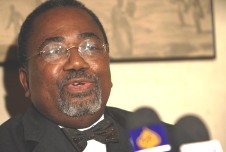African Darfur troops must meet UN standards – joint envoy
August 16, 2007 (EL-FASHER) — Troops pledged by African states for the new joint U.N.-African Union force in Darfur must meet U.N. standards, said Rodolphe Adada, the mission’s head.

AU Commission Chairman Alpha Oumar Konare has said non-African troops are not needed for the joint mission, as African states have pledged enough soldiers.
The comments angered Darfur rebel leaders, who say a 7,000-strong AU force already in Darfur has been unable to stem the violence despite being deployed since 2004. The Sudanese government wants most peacekeepers in the new force to be African.
International experts estimate 200,000 have died and 2.5 million driven from their homes in more than four years of revolt in Darfur.
Adada said new troop commitments by African countries had been encouraging, but what mattered was quality.
“Many African countries are ready to contribute troops and the pledges are very high, but they have to meet the standards of the United Nations,” he told reporters in el-Fasher, capital of North Darfur state late on Wednesday.
U.N. officials have said some African units may not have adequate equipment, especially armoured vehicles, to be part of the joint mission. Peacekeepers are generally expected to bring their own weapons and equipment.
Adada was on his first visit to North Darfur since his appointment as head of the AU mission and joint U.N.-AU operation.
The joint mission will incorporate the existing AU force of 7,000 troops, many of whom are poorly equipped and have not been paid in months because of cash-flow problems.
“Efforts are being made to solve this problem once and for all. In a few days this (pay) problem will be behind us,” Adada told the AU troops in Darfur. He said his first task would be to raise the morale of the troops.
International experts estimate some 200,000 have died and 2.5 million have been driven from their homes in more than four years of fighting in Darfur. Rebels took up arms in early 2003, accusing Khartoum of neglecting the remote region.
Only one of three negotiating rebel factions, a group led by Minni Arcua Minnawi, signed a peace deal with Khartoum last year. Since then the insurgents have split into more than a dozen factions, creating chaos in Sudan’s arid west.
Earlier this month the AU pay difficulties prompted Minnawi to withdraw from the joint ceasefire commission as his and the Sudanese army representatives had their pay cut.
On Wednesday Minnawi’s group rejoined the commission. The AU relies on donors to fund the mission while the joint mission will be paid for directly from the U.N. budget.
(Reuters)
